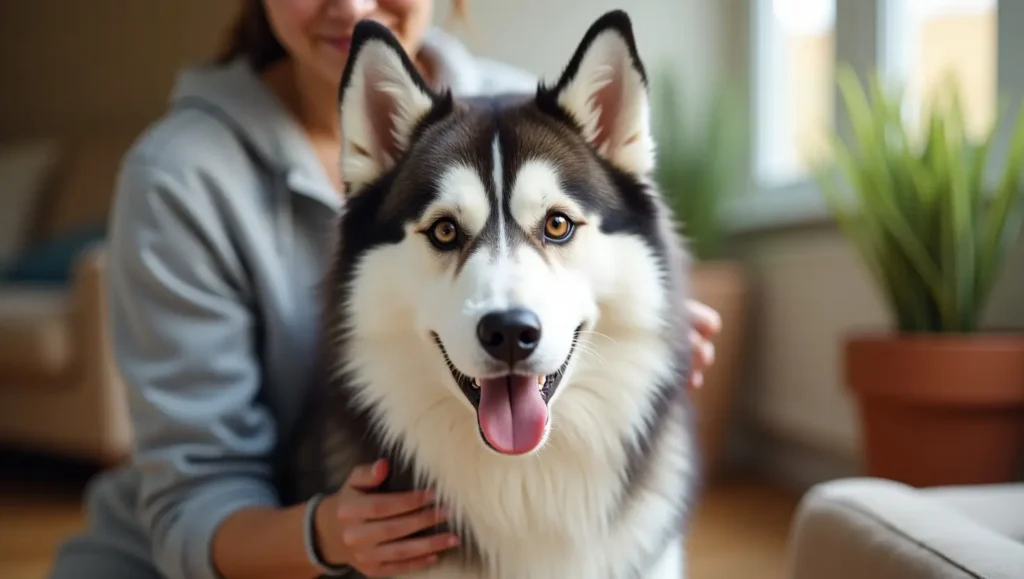Pets are cherished members of our families, and just like us, they need proper care to stay happy and healthy. When it comes to Husky health care, owners must be well-informed about their pet’s unique needs. Huskies are highly energetic, intelligent, and resilient dogs, but their well-being requires careful attention. From nutrition to grooming and exercise, every aspect plays a crucial role in maintaining their overall health.
At WhizPet, we believe that knowledge is the key to responsible pet ownership. That’s why we have conducted in-depth research to bring you this comprehensive guide on Husky health care. Our team has analyzed expert opinions, veterinary insights, and real-life experiences of Husky owners to provide accurate and practical advice. Whether it’s preventive care, dietary recommendations, or exercise routines, this blog covers everything you need to know.
By following the right approach to Husky health care, you can ensure your pet thrives in a healthy and fulfilling life. Let’s explore the essential steps to keep your Husky in peak condition with WhizPet’s trusted guidance!
Understanding Husky Health Care Requirements
Huskies are a resilient breed, originally bred for endurance in harsh climates. However, despite their robustness, Husky health care requires specialized attention to ensure they remain healthy and active. Proper nutrition, exercise, preventive care, grooming, and climate adaptability all play a vital role in their well-being.
1. Nutrition and Diet: Fueling Your Husky’s Energy
A well-balanced diet is the foundation of Husky health care. Since Huskies are highly active dogs, they require high-protein meals to sustain their energy levels. Avoid low-quality fillers in dog food, as Huskies can have sensitive stomachs. A proper feeding schedule of 2–3 meals per day, depending on their activity level, helps maintain optimal health. Essential supplements like Omega-3 for coat health, probiotics for digestion, and joint support can further enhance their overall well-being. Additionally, fresh, clean water is a must, especially after exercise, to prevent dehydration.
2. Exercise Needs: Keeping Your Husky Active
Exercise is a crucial component of Husky health care. These dogs require at least 1–2 hours of physical activity daily, including running, hiking, and interactive play. Mental stimulation is equally important, as Huskies are intelligent and can develop destructive behaviors if bored. Activities like puzzle toys, hide-and-seek, and agility training keep their minds engaged. Regular socialization with other pets and people also contributes to a well-behaved and balanced Husky.
3. Preventive Health Care for Your Husky
Regular veterinary visits are essential in Husky health care to detect potential issues early. Annual checkups help monitor their overall health, while vaccinations protect against serious diseases like rabies, distemper, and parvovirus. Huskies are also prone to conditions such as hip dysplasia, eye diseases like cataracts, and skin sensitivities. Ensuring they receive proper deworming, flea prevention, and dental care can significantly improve their quality of life.
4. Grooming Tips for a Healthy Husky Coat
Huskies have a thick double coat that requires regular maintenance. Brushing 2–3 times a week helps manage shedding, while daily brushing is necessary during seasonal coat changes. Proper Husky health care includes bathing every 1–2 months, regular nail trimming, and ear cleaning to prevent infections. Avoid shaving their coat, as it naturally regulates body temperature and provides protection against various weather conditions.
5. Emergency Health Care: When to Seek Immediate Help
Recognizing signs of illness is an important part of Husky health care. Seek veterinary attention immediately if your Husky exhibits sudden lethargy, difficulty breathing, persistent vomiting, or unusual behavioral changes. Timely intervention can be lifesaving in critical situations.
6. Training and Behavioral Health for a Balanced Husky
Huskies are independent thinkers and require consistent training from an early age. Positive reinforcement techniques work best for obedience training. Crate training can help manage separation anxiety, while leash training is necessary to control their strong prey drive. Proper socialization reduces anxiety and aggression, ensuring a well-mannered pet.
7. Weather Adaptability and Climate Considerations
Huskies are naturally suited for cold weather but still require insulated shelter. In warm climates, it’s essential to provide shade, fresh water, and avoid exercising during peak heat hours. Using paw protection in the snow can prevent frostbite, while cooling mats can help in hot weather.
8. The Cost of Husky Health Care
Owning a Husky comes with financial responsibilities. Monthly expenses include food, grooming, vet visits, and emergency care. Pet insurance is highly recommended to cover unexpected medical costs. Investing in quality food, regular checkups, and training ensures your Husky remains in top condition.

Final Thoughts: Committing to Your Health Care Pet Pull Husky’s Well-Being
Providing excellent health care for your Health Care Pet Pull Husky ensures a happy, active, and fulfilling life. By maintaining proper nutrition, exercise, veterinary care, and grooming, you can enjoy years of companionship with your Husky. Understanding their unique needs will help prevent common health problems and enhance their quality of life.
Call to Action
Want to learn more about Health Care Pet Pull Husky? Subscribe to our newsletter for expert tips, product recommendations, and the latest updates on pet health care! Additionally, share your experiences and tips in the comments below to help fellow Husky owners!

Frequently Asked Questions (FAQs) about Health Care Pet Pull Husky:
1. What is the best diet for a Health Care Pet Pull Husky?
A Husky’s diet should be high in protein and balanced with healthy fats and carbohydrates. Lean meats, fish, and high-quality kibble are ideal. Avoid low-quality fillers and ensure proper hydration.
2. How much exercise does a Husky need daily?
Huskies require at least 1–2 hours of physical activity per day, including running, hiking, and interactive play. Mental stimulation is also important to prevent boredom and destructive behaviors.
3. How often should I take my Husky to the vet?
Routine vet checkups should be done at least once a year for vaccinations, deworming, and overall health assessments. Puppies and senior Huskies may require more frequent visits.
4. What are the most common health issues in Huskies?
Huskies are prone to hip dysplasia, cataracts, progressive retinal atrophy, skin sensitivities, and zinc deficiency. Regular vet visits and a well-balanced diet help prevent these issues.
5. How should I groom my Husky to maintain a healthy coat?
Brush your Husky 2–3 times a week to manage shedding and keep the coat healthy. During shedding season, daily brushing is recommended. Bathe your Husky every 1–2 months, and avoid shaving their coat.
6. What is the average cost of Husky health care per month?
Monthly expenses for Husky care vary but typically range between $100–$300, including food, grooming, vet visits, and pet insurance.
Emergency vet visits can add unexpected costs, so having insurance is recommended.
Related blog: For more detailed information about pet care

